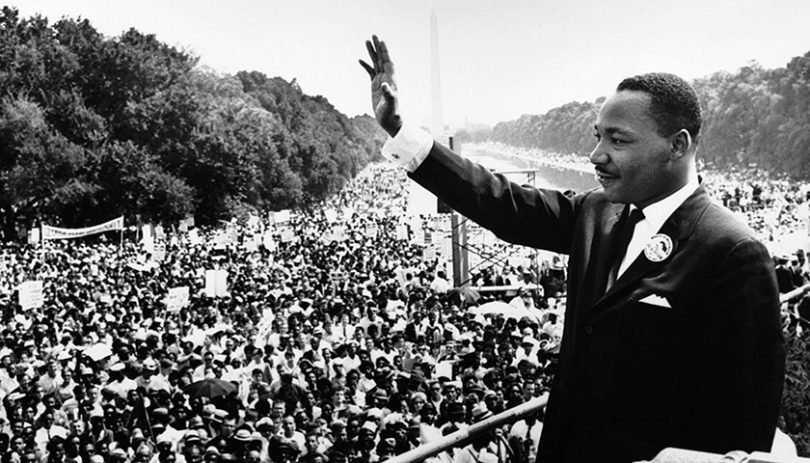#NNPA BlackPress
Six Decades After King’s Historic Speech, Report Shows Black Economic Equality is ‘Still a Dream’
NNPA NEWSWIRE — Further, the wealth gap between Black and non-Black Americans has experienced only marginal growth, with African Americans possessing eighteen cents for every dollar of non-Black wealth in 2019. If this pace continues, it will take approximately 780 years for Black wealth to match non-Black wealth.
The post Six Decades After King’s Historic Speech, Report Shows Black Economic Equality is ‘Still a Dream’ first appeared on BlackPressUSA.

By Stacy M. Brown
NNPA Newswire Senior National Correspondent
@StacyBrownMedia
Sixty years after Dr. Martin Luther King Jr. delivered his iconic “I Have a Dream” speech during the March on Washington for Jobs and Freedom, a groundbreaking new report has laid bare the stark truth of ongoing Black economic inequality in the United States. Titled “STILL A DREAM: Over 500 Years to Black Economic Equality,” the report, is co-authored by prominent experts Dedrick Asante-Muhammad, Chuck Collins, Omar Ocampo, and Sally Sim. Published by the Institute for Policy Studies (IPS) and National Community Reinvestment Coalition (NCRC) they underscore the enduring disparities faced by Black Americans and highlights the pressing need for concerted action to address these disparities. “Sixty years ago, Dr. King observed that America has defaulted on this promissory note to Black citizens,” stated Chuck Collins, an IPS senior scholar who directs the Program on Inequality and the Common Good in Washington, DC.
“Six decades later, despite incremental progress on some fronts, the check of opportunity has still come back with insufficient funds.” Stated by Dedrick Asante-Muhammad, Chief of Race, Wealth, and Community for NCRC, lamented, “It is deeply troubling that, sixty years after the March on Washington for Jobs and Freedom, Black economic equality remains nothing more than a dream for most Black Americans.” “The revelation that it would take more than 500 additional years to close the economic gap for Black Americans is a stark reminder of the systemic inequities that persist,” Asante-Muhammad asserted. Sally Sim, a senior organizer, and project specialist at NCRC, emphasized the urgency of the situation. “The sobering projection and findings of our report sixty years after the March on Washington for Jobs and Freedom reinforce that the dream for economic equality for Black Americans remains unfulfilled,” Sim stated.
“On this historic anniversary, let us turn this report into a catalyst for meaningful action towards comprehensive solutions and public support for policies and initiatives that promote Black economic equality.” Some key findings from the comprehensive report were that despite modest advancements made by African Americans since the 1960s, including reduced poverty rates, increased high school attainment, and lower unemployment rates, income disparities between Black and white Americans have only slightly improved. The report exposes that in 2021, African Americans earn sixty-two cents to every dollar earned by white families. The report’s authors said, at this rate, achieving income parity would take an astonishing 513 years.
Further, the wealth gap between Black and non-Black Americans has experienced only marginal growth, with African Americans possessing eighteen cents for every dollar of non-Black wealth in 2019. If this pace continues, it will take approximately 780 years for Black wealth to match non-Black wealth. Median household income for African Americans has shown minimal growth, growing just 0.36% since the turn of the century. Strikingly, it remained lower than white median family income in 1963. Even after over six decades, the Black-white homeownership divide persists.
Black homeownership has grown from 38% in 1960 to 44% in 2021, while white homeownership surged from 64% in 1960 to 74% in 2021.The report outlined a series of recommendations to combat Black economic inequality:
- Advocate for full employment and guaranteed jobs to ensure equal economic opportunities for all.
- Enact a substantial land and homeownership program to address the enduring homeownership gap between Black and white Americans.
- Commit to individual asset building, including financial education, asset matching programs, and supportive policies, to facilitate access to wealth-building opportunities for Black Americans.
- Implement policies to reduce dynastic concentrations of wealth and power, tackling the structural barriers that impede economic progress for Black Americans.
- Explore targeted reparations to address historical injustices and provide meaningful redress for the economic disparities Black Americans face.
The authors noted that, as the nation reflects on King’s enduring vision for equality and justice, the report serves as a sobering reminder that pursuing Black economic equality remains an unmet challenge in America. “The findings of this report are sobering and demand immediate and comprehensive action to address the economic disparities faced by African Americans,” remarked Omar Ocampo, a researcher for the Program on Inequality and the Common Good at IPS. “We must invest in transformative policies that address systemic racism and create an equitable society.”
The post Six Decades After King’s Historic Speech, Report Shows Black Economic Equality is ‘Still a Dream’ first appeared on BlackPressUSA.
#NNPA BlackPress
Remembering George Floyd
#NNPA BlackPress
OP-ED: Oregon Bill Threatens the Future of Black Owned Newspapers and Community Journalism
BLACKPRESSUSA NEWSWIRE — Nearly half of Oregon’s media outlets are now owned by national conglomerates with no lasting investment in local communities. According to an OPB analysis, Oregon has lost more than 90 news jobs (and counting) in the past five years. These were reporters, editors and photographers covering school boards, investigating corruption and telling community stories, until their jobs were cut by out-of-state corporations.

By Dr. Benjamin F. Chavis, Jr.
President and CEO, National Newspaper Publishers Association
For decades, The Skanner newspaper in Portland, the Portland Observer, and the Portland Medium have served Portland, Oregon’s Black community and others with a vital purpose: to inform, uplift and empower. But legislation now moving through the Oregon Legislature threatens these community news institutions—and others like them.
As President and CEO of the National Newspaper Publishers Association (NNPA), which represents more than 255 Black-owned media outlets across the United States—including historic publications like The Skanner, Portland Observer, and the Portland Medium—l believe that some Oregon lawmakers would do more harm than good for local journalism and community-owned publications they are hoping to protect.
Oregon Senate Bill 686 would require large digital platforms such as Google and Meta to pay for linking to news content. The goal is to bring desperately needed support to local newsrooms. However, the approach, while well-intentioned, puts smaller, community-based publications at a future severe financial risk.
We need to ask – will these payments paid by tech companies benefit the journalists and outlets that need them most? Nearly half of Oregon’s media outlets are now owned by national conglomerates with no lasting investment in local communities. According to an OPB analysis, Oregon has lost more than 90 news jobs (and counting) in the past five years. These were reporters, editors, and photographers covering school boards, investigating corruption, and telling community stories, until their jobs were cut by out-of-state corporations.
Legislation that sends money to these national conglomerate owners—without the right safeguards to protect independent and community-based outlets—rewards the forces that caused this inequitable crisis in the first place. A just and inclusive policy must guarantee that support flows to the front lines of local journalism and not to the boardrooms of large national media corporations.
The Black Press exists to fill in the gaps left by larger newsrooms. Our reporters are trusted messengers. Our outlets serve as forums for civic engagement, accountability and cultural pride. We also increasingly rely on our digital platforms to reach our audiences, especially younger generations—where they are.
We are fervently asking Oregon lawmakers to take a step back and engage in meaningful dialogue with those most affected: community publishers, small and independent outlets and the readers we serve. The Skanner, The Portland Observer, and The Portland Medium do not have national corporate parents or large investors. And they, like many smaller, community-trusted outlets, rely on traffic from search engines and social media to boost advertising revenue, drive subscriptions, and raise awareness.
Let’s work together to build a better future for Black-owned newspapers and community journalism that is fair, local,l and representative of all Oregonians.
Dr. Benjamin F. Chavis Jr., President & CEO, National Newspaper Publishers Association
#NNPA BlackPress
Hate and Chaos Rise in Trump’s America
BLACKPRESSUSA NEWSWIRE — Tactics ranged from local policy manipulation to threats of violence. The SPLC documented bomb threats at 60 polling places in Georgia, traced to Russian email domains.

By Stacy M. Brown
Black Press USA Senior National Correspondent
The Southern Poverty Law Center has identified 1,371 hate and antigovernment extremist groups operating across the United States in 2024. In its latest Year in Hate & Extremism report, the SPLC reveals how these groups are embedding themselves in politics and policymaking while targeting marginalized communities through intimidation, disinformation, and violence. “Extremists at all levels of government are using cruelty, chaos, and constant attacks on communities and our democracy to make us feel powerless,” said SPLC President Margaret Huang. The report outlines how hard-right groups aggressively targeted diversity, equity, and inclusion (DEI) initiatives throughout 2024. Figures on the far right falsely framed DEI as a threat to white Americans, with some branding it a form of “white genocide.” After the collapse of Baltimore’s Francis Scott Key Bridge, a former Utah legislator blamed the incident on DEI, posting “DEI = DIE.”
Tactics ranged from local policy manipulation to threats of violence. The SPLC documented bomb threats at 60 polling places in Georgia, traced to Russian email domains. Similar threats hit Jewish institutions and Planet Fitness locations after far-right social media accounts attacked them for trans-inclusive policies. Telegram, which SPLC describes as a hub for hate groups, helped extremists cross-recruit between neo-Nazi, QAnon, and white nationalist spaces. The platform’s lax moderation allowed groups like the Terrorgram Collective—designated terrorists by the U.S. State Department—to thrive. Militia movements were also reorganized, with 50 groups documented in 2024. Many, calling themselves “minutemen,” trained in paramilitary tactics while lobbying local governments for official recognition. These groups shared personnel and ideology with white nationalist organizations.
The manosphere continued to radicalize boys and young men. The Fresh & Fit podcast, now listed as a hate group, promoted misogyny while mocking and attacking Black women. Manosphere influencers used social media algorithms to drive youth toward male-supremacy content. Turning Point USA played a key role in pushing white nationalist rhetoric into mainstream politics. Its leader Charlie Kirk claimed native-born Americans are being replaced by immigrants, while the group advised on Project 2025 and organized Trump campaign events. “We know that these groups build their power by threatening violence, capturing political parties and government, and infesting the mainstream discourse with conspiracy theories,” said Rachel Carroll Rivas, interim director of the SPLC’s Intelligence Project. “By exposing the players, tactics, and code words of the hard right, we hope to dismantle their mythology and inspire people to fight back.”
Click here for the full report or visit http://www.splcenter.org/resources/guides/year-hate-extremism-2024.
-

 #NNPA BlackPress3 weeks ago
#NNPA BlackPress3 weeks agoMLK Bust Quietly Removed from Oval Office Under Trump
-

 Activism4 weeks ago
Activism4 weeks agoOakland Post: Week of April 30 – May 6, 2025
-

 Activism3 weeks ago
Activism3 weeks agoOakland Post: Week of May 7 – 13, 2025
-

 #NNPA BlackPress3 weeks ago
#NNPA BlackPress3 weeks agoTrump Abruptly Fires First Carla Hayden: The First Black Woman to Serve as Librarian of Congress
-

 Activism2 weeks ago
Activism2 weeks agoNew Oakland Moving Forward
-

 Activism2 weeks ago
Activism2 weeks agoAfter Two Decades, Oakland Unified Will Finally Regain Local Control
-

 Activism2 weeks ago
Activism2 weeks agoOakland Post: Week of May 14 – 20, 2025
-

 Alameda County2 weeks ago
Alameda County2 weeks agoOakland Begins Month-Long Closure on Largest Homeless Encampment


















































